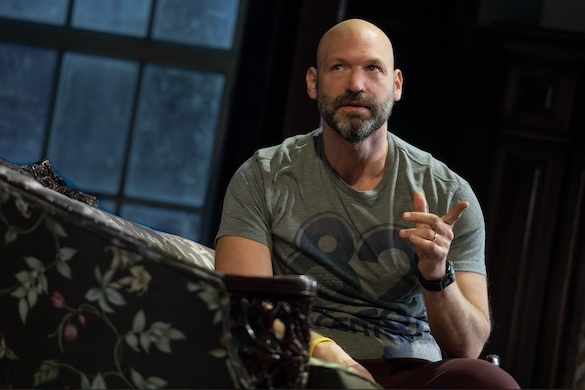A Powerful Testament to the Enduring Toxicity of Racism, ‘Appropriate’ Is Also Funny
The new production of Brendan Jacobs-Jenkins’s play features something you seldom see on a Broadway stage these days: an all-white cast. Black people figure prominently, but we never see them.

The new production of Brendan Jacobs-Jenkins’s “Appropriate” features something you seldom see on a Broadway stage these days: an all-white cast. An Obie Award-winning playwright and two-time Pulitzer Prize finalist, Mr. Jacobs-Jenkins is Black, and Black people figure prominently in this crackling tragicomedy, but we never see them; they are present, however — hauntingly, shatteringly present.
First produced off-Broadway nearly a decade ago, and set in 2011, “Appropriate” follows three middle-age siblings who have gathered at a former plantation home in Arkansas after the death of their father. The house is a vast, vaguely ravaged place (designed by the collective dots) that will itself emerge as a character. It had been occupied by the patriarch for 20 years; prior to that, he was a man of some distinction at Washington.
The move south, we learn, was spurred by tragedy and dysfunction: The man’s wife died, and their younger son, Frank, spiraled into drug abuse and other destructive behavior, courting legal trouble. The eldest child, Toni, wound up caring for her dad and brother, and has lately faced similar problems with her own son while also grappling with a bitter divorce.
Yet none of these details will likely prepare you for the revelation that arrives early in the play, when a certain collection is discovered among the artifacts and piles of clutter the old man left in the house. The contents — which we never see, mercifully — are, suffice it to say, unimaginably grisly, and lay the groundwork for as powerful a testament to the enduring toxicity of racism as I’ve ever seen.

The bigotry unearthed in “Appropriate” extends beyond skin color. The middle sibling, Bo, is married to a Jewish woman, Rachael, who apparently wasn’t adored by her father-in-law. Toni, brought to life in a ferociously witty, ultimately heartbreaking performance by Sarah Paulson, is her dad’s fiercest defender, though all the characters, and their motives, are shown to be more complex.
Wisely, Mr. Jacobs-Jenkins and director Lila Neugebauer have opted to keep the play in its original period. It would be difficult to imagine, for instance, a teenager today having as relatively blasé a reaction as Bo and Rachael’s daughter does to the hideous materials recovered in her grandfather’s home, as anti-racism is taught in schools and terms like “white privilege” and “white fragility” pop up regularly in conversation and debates.
If “Appropriate” doesn’t necessarily recognize the potential for progress, within the family or on a larger scale, that’s not Mr. Jacobs-Jenkins’s responsibility as a dramatist, any more than it was for Tennessee Williams or Eugene O’Neill. The latter-day playwright was reading both 20th-century giants intently, he has said, when he began writing this piece, and the influence is palpable.
Even at its most scathing, though, “Appropriate” can be very funny, sometimes outrageously so, finding cathartic humor in the most seemingly, well, inappropriate places. Ms. Neugebauer culls comically potent and poignant turns from each of her actors, among them stage and screen veterans Corey Stoll and Natalie Gold, who deftly survey rising tensions between Bo and Rachael while ensuring the love between them is always tangible.
Graham Campbell brings hilarious authenticity to the role of Rhys, Toni’s somewhat petulant if understandably overwhelmed son, and Michael Esper mines the spoiled brat and lost soul twisted inside Frank, who ostentatiously identifies as “Franz.” Film star Elle Fanning proves similarly canny as Franz’s 23-year-old girlfriend, who calls herself River and is alternately pegged as a gold-digger and a dizzy hippie; she refers more than once to spirits lurking in the house.
Bray Poor and Will Pickens’s sound design can also suggest such presences: “Appropriate” begins with the loud chirping of “a billion cicadas,” as the stage directions indicate, and its conclusion is even more striking, and chilling, both sonically and visually. It’s not for the faint of heart, but neither are many productions that shouldn’t be missed, so pluck up your courage.

